What are you looking for?
Search
Washing jerseys the right way: Instructions & tips
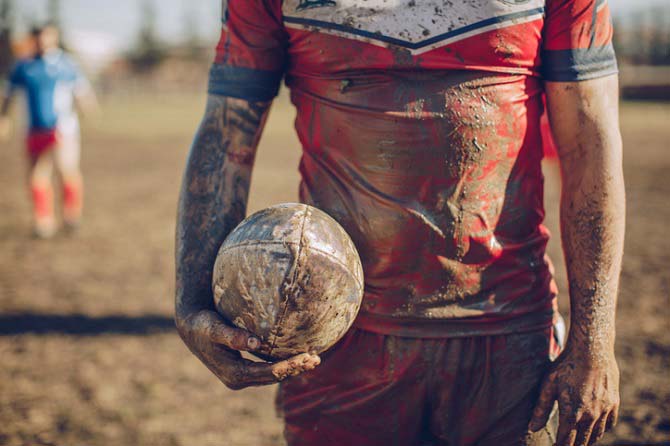
If jerseys are washed properly, they will look good as new for many years.
We expect much from them, and they are not particularly cheap - sports jerseys. To ensure you can wear them for seasons to come, proper care is crucial. We'll therefore explain what you need to pay attention to when washing, what you should avoid at all costs and how to care for your jersey properly between washes.
Here's how to ensure your jersey remains good as new
Tips for washing jerseys
- In order to prevent the letters and numbers on the football jersey from falling off due to washing, you can adopt the following scientific cleaning methods:
- Avoid high temperatures: High temperatures can cause the glue of the printed material to melt or deteriorate. It is recommended to use cold or warm water (below 30°C) for washing, and never use hot water.
- Wash the football jersey on the reverse side: Turn the football jersey over so that the side with the letters and numbers is facing inward, which can reduce their friction with the washing machine drum or other clothes.
- Hand wash first: If possible, it is best to hand wash the football jersey, especially the printed part. When hand washing, use a mild detergent and rub gently to avoid excessive rubbing of the printed area.
- Use a net bag: If you want to wash it in a washing machine, put the football jersey in a laundry net bag to reduce friction and pulling between clothes.
- Avoid bleach and strong detergents: These chemicals will damage the printed material, try to use neutral or mild detergents.
- Do not wring: Do not wring the football jersey after washing, it is best to let the water drip dry naturally, or press with a towel to absorb excess water.
- Avoid drying: The high temperature of the dryer will cause the letters and numbers to fall off. It is recommended to dry naturally, avoid direct sunlight, and preferably place it in a cool and ventilated place.
- Avoid ironing: Do not iron the parts with letters and numbers directly. If you must iron the clothes, make sure to use a low temperature setting and put a layer of cloth on the letters and numbers.
Washing jerseys - here's how it works
Washing your sportswear isn't rocket science. There are just a few things to keep in mind:
- Wash your sportswear no warmer than 30°C (86°F).
- Do not use fabric softener or detergent.
- You may put jerseys in the dryer, but at low temperatures. We recommed air drying.
What else you need to consider, which detergent is best suited for jerseys and how to wash your jersey properly when travelling is explained below.
Before you start cleaning, you should always read the manufacturer's washing instructions.
Washing instructions: detergent, washing cycle & Co.
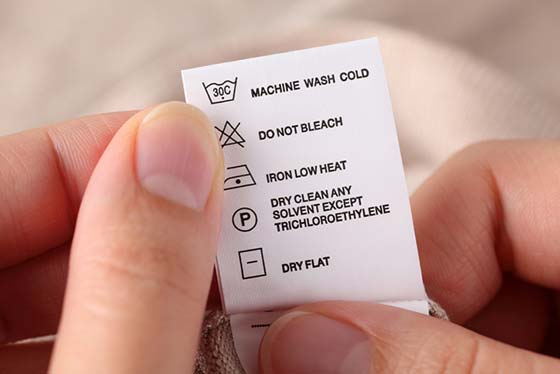
Always follow the manufacturer's instructions before washing.
Before wearing your jersey for the first time, you should always wash it, as it passes through many hands and machines during production. In addition, many textiles only achieve their final fit after the first couple of washes.
In general, we recommend not washing sportswear with membranes (for example sports jackets) too often, as the membranes get destroyed in the long run. However, you should not forgo washing altogether, as salt crystals from sweat, impurities and grease clog the pores of the membrane. These residues are removed through washing.
To ensure that your sportswear is not damaged from washing, note the following:
- Turn the laundry inside out.
- Wash at 30°C (86°F).
- Take the jerseys directly out of the drum after the washing cycle and do not leave them wet.
- You can use a laundry bag to protect the jerseys (especially recommended for velcro and zippers).
Caution: Screen printing graphics on jerseys can fade or even fall off in a wash cycle.
Caution with velcro and zippers
Velcro and zippers roughen up your sportswear during washing and can pull on threads. This damages the fabric, meaning that your jersey can no longer perform at full capacity.

Jerseys with zips and velcro fasteners should be washed in a laundry bag.
To avoid this, close zippers and velcro fasteners before washing and put the laundry in a laundry bag.
By the way, chafing does not endanger your clothes only when washing. Rough backpacks or rucksacks can also roughen the surface of your sportswear and thus damage it.
Our recommendation: It's ok to wash your jerseys in a small load. That way, there's less friction to damage your jersey. If possible, you can also do without spinning or set a low number of revolutions.
Washing jerseys: The right detergent
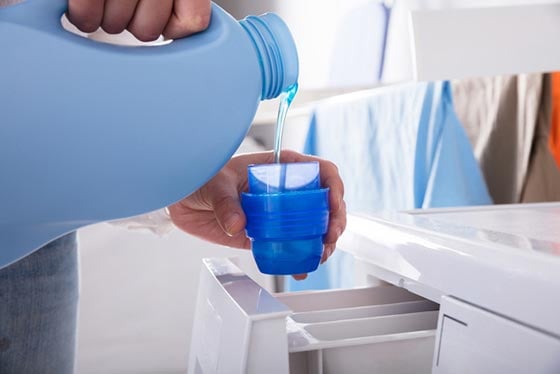
The right detergent is crucial when washing your sportswear.
The detergent is the most important aspect when it comes to washing jerseys properly. Colour detergents or mild detergents are very suitable. You can do without sports detergents and you should never add fabric softener to your laundry. We will explain why this is the case and the advantages and disadvantages of the various detergents.
Sports detergents
According to rinse.com you can use special detergent for functional clothing (often offered as sports detergent) but it is equally ok to use conventional colour detergents whithout whiteners or colour enhancers.
Even on sports jackets, which have to be sprayed regularly, special detergents have no particular effect. This is because they do not contain the agent to water proof. You can find out how to water proof your jacket correctly from the manufacturer or in the product information.
A special detergent for sports and functional clothing is therefore not necessary.
Fabric Softener
Under no circumstances should you use fabric softener when washing your jersey. With microfibre textiles, the tiny fibres are glued together and thus robbed of their function. And even with membranes, residues of fabric softeners settle in the pores of the membrane and stick together. Moisture, which results from perspiration, can thus no longer be transported to the outside by the difference in vapour pressure. Fabric softener therefore hinders breathability and ensures that it stays unpleasantly wet under your jersey.
The same effect can also be seen on towels. If they are washed with fabric softener, they clearly lose their absorbency.
Mild Detergent
Delicate detergents are gentle and therefore particularly suitable for sensitive textiles. They do not contain bleaching agents, enzymes or optical brighteners that bleach the garment or attack the material.
Delicate detergent cleans mainly at low temperatures; discolouration inhibitors prevent discolouration (nevertheless, you should always sort laundry by colour). Due to its gentle properties, it is also suitable for hand washing, as it does not irritate the skin.
Disadvantages of mild detergents:
- They are only effective up to a maximum of 30°C (86°F).
- They are not suitable for heavy dirt as it has a poorer cleaning performance than other detergents.

Sportswear should be washed at a maximum of 30°C (86°F).
Colour detergents
You can also use colour detergent for your jerseys. It prevents the colour from fading and removes even heavy dirt. Although it is more aggressive than mild detergent, it is not as harmful as heavy-duty detergent.
Heavy-duty detergent
Under no circumstances should you use heavy-duty detergent. It contains fillers that clog the pores of the membrane. It also contains enzymes that are supposed to remove stains better, but at the same time attack the colour.
The same applies to white laundry detergents, as they contain bleaching agents that quickly cause the jersey to lose colour.
In general, you should only use liquid detergent, as detergent in powder form does not dissolve properly at low temperatures and residues remain on clothing. These attack the membrane or surfaces of your jerseys and irritate the skin.
Removing stains from the jersey
Since you should only wash your jerseys at a maximum of 30°C (86°F), you can treat stains before the wash cycle. Blood stains should always be washed cold before washing. When heated, the blood stagnates and leaves yellow or rust-brown stains, which can then only be removed with bleach.
In the owayo test labs, very good results have been achieved in removing stubborn stains with the special washing programmes of modern washing machines. Even stubborn stains that could not be removed with stain removers have been completely removed with special programmes. These special cleaning programmes are available for "blood", "wine" or "oil". Some of these programmes run for very long periods (up to 5 hours) and are therefore particularly effective.
Can jerseys go in the dryer?
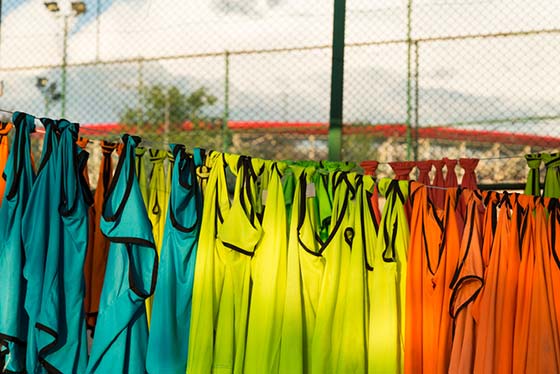
Jerseys are best left to air dry in the shade.
Yes, jerseys may be put in the dryer at low temperatures. But be careful with machine dryers that are not state of the art. The actual temperature often does not correspond to the temperature on the dial.
If the jerseys are dried too hot, the colour can change or the clothing may even get damaged.
We therefore recommend that you let your jerseys air dry. This not only protects your jerseys, as they are less exposed to friction, but also the environment. In addition, functional clothing dries quickly and is only slightly damp after being spun in the washing machine.
Under no circumstances should you dry the jerseys on the heater, as strong heat exposure over a longer period of time can cause discolouration. Direct sunlight can also be too warm when drying.
There is often concern that strong UV radiation could fade the colours of the jerseys. Although this is theoretically correct, in practice even frequently worn garments are not exposed to the sun long enough to fade. This effect is only observed with textiles that are actually exposed to the sun around the clock. This is the case with flags or advertising banners, for example.
Jersey care between wash cycles
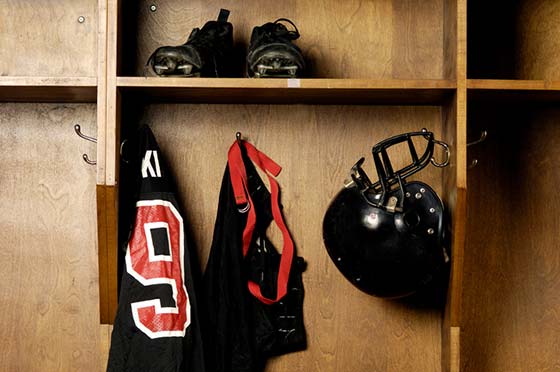
After sports, you should always hang your jersey up to dry.
You should also take good care of your jerseys between washes, so that the quality lasts for years to come.
It is important that you always hang up your jersey after use and let it dry if it is not washed directly. You should never leave it crumpled up in the sports bag. Once you have arrived home, you should always store the jersey. Do not leave it in the sports bag until the next training session.
Washing jerseys properly when travelling
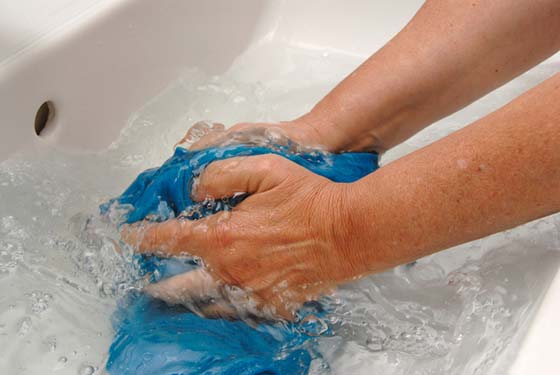
When travelling, you can easily wash your jersey by hand.
You are travelling and cannot put your jerseys in the washing machine? No problem. You can always wash your jerseys by hand. Simply use a hand washing detergent. As these are specially made for contact with the hands, they are more gentle than normal detergents and therefore also harmless for your sportswear.
It is important that you rinse out the detergent completely. The remains of detergent on the garment can irritate the skin and damage the material.
After you have washed your jersey, you should hang it up and let it dry completely. Never pack it in your travel bag while still damp or place it on the heater to dry faster.
Make your jersey last a life time
As you see, washing sportswear is not as complicated as it seems at first. If you choose the right detergent, gentle drying and a wash cycle at 30°C (86°F), your sports jersey will serve you reliably for a long time.
